Athenian Democracy and the Roman Republic
The first significant historical examples of rule by consent of the governed were the city-state of Athens in the fifth century BCE and the Roman Republic from the sixth to first centuries BCE. They were among the most successful economic and military powers of their time.
The first significant historical examples of rule by consent of the governed were the city-state of Athens in the fifth century BCE and the Roman Republic from the sixth to first centuries BCE. They were among the most successful economic and military powers of their time.
Athens is an historical example of direct democracy. All citizens assembled regularly to decide various questions facing the polis (or city-state). All major decisions, especially on issues of war, peace and trade, were made by the citizenry as a whole, gathered in an assembly. For the regular daily functions of governance, the Athenian Assembly elected certain categories of public servants (including generals), while many other temporary officeholders and juries were chosen by lot. The voting body of citizens included all adult males of Athenian descent, leaving out resident foreigners, women and slaves.
Unlike Athens, Rome was governed through representative institutions and officials. There were two representative institutions organized by class: the Senate and the Plebeian Council. Senators belonged to the elite large landowning class, known as patricians, and held the greater power to determine the affairs of state. The plebeians made up the rest of the citizenry, including small landowners, merchants and soldiers. Much of the power of the state, though, was exercised through a range of elective offices. These were determined by election in assemblies organized and weighted according to tribe, class and wealth. Mostly, patricians held such offices, which were then seen as the basis for appointment to the Senate.
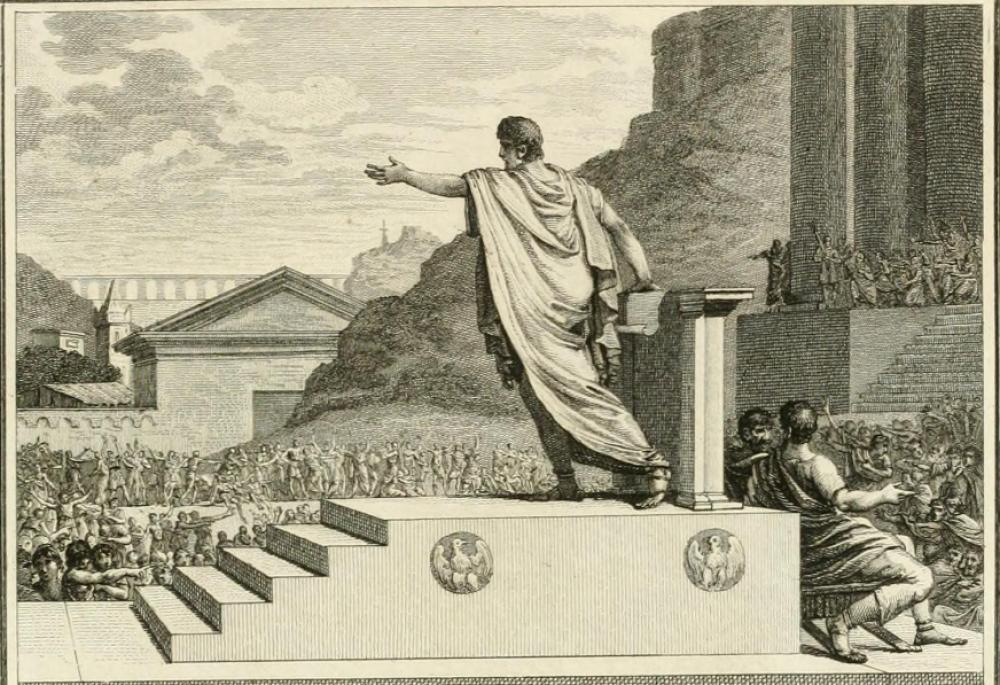
Above, a depiction of Gaius Gracchus, a Tribune of the People (123-122 BCE), addressing the Plebeian Council.
In the first century BCE, largely due to its class struggles, the Roman Republic fell to rule by a triumvirate of generals. Its most powerful ruler, Julius Caesar, came to assert dictatorial power. After being assassinated, Caesar’s heir, Octavian (later known as Augustus), declared himself the first Roman emperor. He founded a dynasty and turned the state into an autocracy, with the emperor ruling over the Senate and eventually eliminating the Plebeian Assembly.
Neither Athens nor Republican Rome was fully democratic in today's sense. Still, their influence on our political thinking is evident in our language. As Professor Bernard Crick of Oxford University notes, “Almost the whole vocabulary of politics, ancient and modern, is Greek and Roman in origin: autocracy, tyranny, despotism, politics and polity, republic, senate, city, citizen, representative.” And, of course, democracy.
The British Experience
Direct and representative democracy re-emerged in limited form in certain parts of Europe at the time of the Renaissance (such as in Italian city-states and Swiss cantons). But a more significant precedent for consent of the governed is found in the English civil wars from 1642–60.
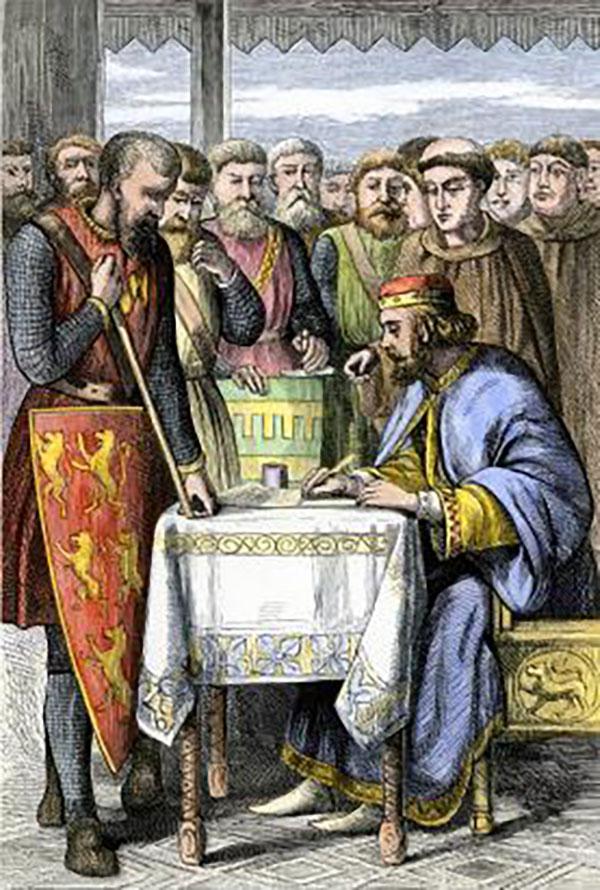
Above, a depiction of King John of England signing the Magna Carta on June 15, 1215 before assembled nobles at Runnymede, England (held at the Granger Collection in New York). Wikipedia Commons.
Centuries earlier, in 1215, the Magna Carta (or Great Charter) obliged the king of England to recognize certain rights of noblemen, clergy and townsmen in his realm. This led to the creation of a parliament, which was divided into two chambers in the 14th century. An upper House of Lords comprised the high clergy and nobles designated by the King with hereditary rank. A lower House of Commons was made up of elected representatives of property owners in counties and boroughs.
From 1625 to 1640, the king, Charles I, defied Parliament and ruled in an absolutist manner, violating principles of governance emerging since the Great Charter. He attempted to impose uniform religious practices aimed at restoring Catholicism and raised revenue without Parliament’s consent, including to wage war with Scotland. When summoned in 1640 to raise necessary taxes, the House of Commons, by then representing a larger number of property owners and householders, acted to protect the people’s “common liberties” and restrict the king’s powers. Forming its own army, it ultimately defeated the king’s forces. Charles I was captured, tried and executed and in 1649, the House of Commons declared England “a Commonwealth and Free State.”
[T]he English Civil Wars and Commonwealth introduced basic republican principles within the British constitutional system for respecting the will of the people and their rights.
The Commonwealth, which expanded by force to Scotland and Ireland in 1653, was short-lived under the militarist and increasingly authoritarian leadership of Oliver Cromwell and his son. The monarchy was restored in 1660. But the Civil Wars and Commonwealth introduced basic republican principles within the British constitutional system for respecting the will of the people and their rights.
Soon after, in 1688, the House of Commons again forced a monarch, James II (son of Charles II), from the throne for trying to assert absolutist powers in what was called the Glorious Revolution. He was replaced with his daughter, Mary II and her husband William of Orange from the Netherlands, after he suppressed James II’s army. The House of Commons then adopted the Act of Succession, the English Bill of Rights and other acts that firmly instituted parliament’s power to determine monarchical succession and to protect the people’s “common liberties,” expand representation and govern in most matters of state.
John Locke and the Origins of Consent of the Governed
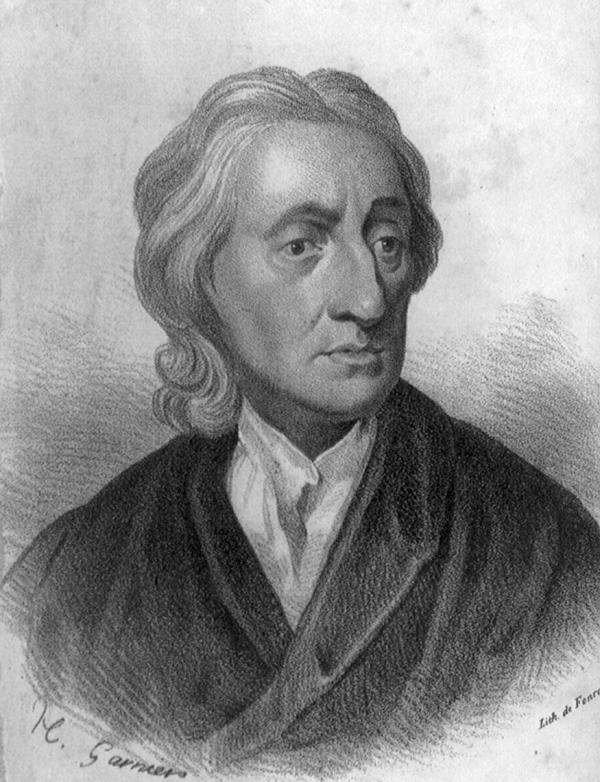
John Locke, above, was among the early Enlightenment thinkers. In The Two Treatises of Government, he asserted the natural or inalienable rights of “life, liberty, and estate” to argue in favor of forms of self-governance against absolute monarchy. An early portrait. Public Domain.
While the idea was considered by earlier thinkers, consent of the governed was asserted in modern political thought most significantly by the British philosopher John Locke (1632–1704). In his Two Treatises on Government and other works, Locke used the philosophy of empiricism — the belief that knowledge is based on sensory experience — to reject the arbitrary rule of a monarch and to assert instead a general theory of rights that exist and could be identified in “a state of nature.” His ideas heavily influenced the framers of the US Constitution.
Locke's arguments were in direct contradiction to those of another influential philosopher, Thomas Hobbes. In his book, Leviathan, Hobbes had theorized differently on the “natural law.” In his view, a state of nature was one where all competed ruthlessly against one another for gain — an existence that was “nasty, brutish, and short.” In such a state, Hobbes argued, individuals naturally give away their rights to an all-powerful ruler in order to gain security and freedom from a precarious existence.
Government . . . is legitimate only through the consent or agreement of those governed and only as long as it satisfies the fundamental needs of those being governed. Locke argued that a government that violates the natural rights and trust of the people loses its legitimacy and should be overthrown.
Locke argued that Hobbes’s premise was fundamentally wrong. He wrote, “The state of nature has a law of nature to govern it which obliges everyone . . . [not] to harm another in his life, health, liberty or possessions.” That is, in a rational understanding of nature, human beings tried to live among one another peacefully. There was no inherent need for a supreme authority to wield arbitrary or unchecked rule.
In his Second Treatise of Government, Locke explained the logic of a government based on the consent of the governed. While most people recognize the moral obligation not to do harm, government is needed to protect the people's peace and prosperity against the inevitable few who would violate the natural law not to harm another. Government is also necessary to resolve disagreements over property and other matters that are inherently disputable. Government, however, is legitimate only through the consent or agreement of those governed and only as long as it satisfies the fundamental needs of those being governed. Locke argued that a government that violates the natural rights and trust of the people loses its legitimacy and should be overthrown.
The US Experience
The US Declaration of Independence is a succinct statement of Locke’s principle of the people's inherent right to rebel against tyranny and establish popular government by consensual rule.
Locke was writing in part to justify the Glorious Revolution of 1688 and parliament’s ultimate assertion of power over the monarch. A century later, Locke's ideas played a central part in the American Revolution of 1776. As sovereign, the British monarch still held near-absolute power over foreign-held territories such as the thirteen American colonies. The colonies’ elected representatives determined to separate from Great Britain after King George III refused their demands for greater authority and acted to impose repressive rule over the colonists (just as Charles I and James II had refused the demands of their own parliaments). The US Declaration of Independence is a succinct statement of Locke’s principle of the people's inherent right to rebel against tyranny and establish popular government by consensual rule.
[T]he Declaration’s rejection of monarchy and its assertion of the 'will of the people' as a principle for sovereign rule made consent of the governed an ideal for a new form of government that broke with all previous forms of autocracy and inspired revolutionary movements in Europe and other parts of the world.
The United States of America was the first modern republic formed around the idea of consent of the governed. As in Britain, America’s original consent was based on a limited franchise. Nearly all women, those held in bondage or indentured servitude, as well as Native Americans, among others, were excluded from the franchise. Fulfilling the ideals of the Declaration in the U.S. would require prolonged and bloody struggles to end slavery and expand civil rights and the right to vote to all citizens. (An account of that history is in Free, Fair and Regular Elections.) Still, the franchise extended to a much larger percentage of the people in most states than in Great Britain. More fundamentally, the Declaration’s rejection of monarchy and its assertion of the “will of the people” as a principle for sovereign rule made consent of the governed an ideal for a new form of government that broke with all previous forms of autocracy and inspired revolutionary movements in Europe and other parts of the world.
Jean-Jacques Rousseau and the French Revolution
The French Revolution in 1789 was the second great assertion of self-governance by popular revolt. It overthrew the absolute monarchy of Louis XVI and France’s Bourbon dynasty to establish a citizens’ republic with general male suffrage. The French Revolution, partly inspired by the American Revolution, drew on other philosophical influences.
France's Declaration of the Rights of Man and of the Citizen, adopted by its National Assembly, was a more sweeping and radical assertion of human rights, equality and the ideals of a just society.
Indeed, France's Declaration of the Rights of Man and of the Citizen, adopted by its National Assembly, was a more sweeping and radical assertion of human rights, equality and the ideals of a just society. In this regard, it reflected the greater influence on the French Revolution of the philosopher Jean-Jacques Rousseau, who wrote that a good government should protect not just individual interests and rights (as Locke asserted) or the right of the state in ruling over the people (as Hobbes argued), but more the general interests of the people as a whole. It should represent the common or “general will” based on reason. His views were the basis later for many communitarian philosophies and also inspired in part the development of social democracy in Europe.
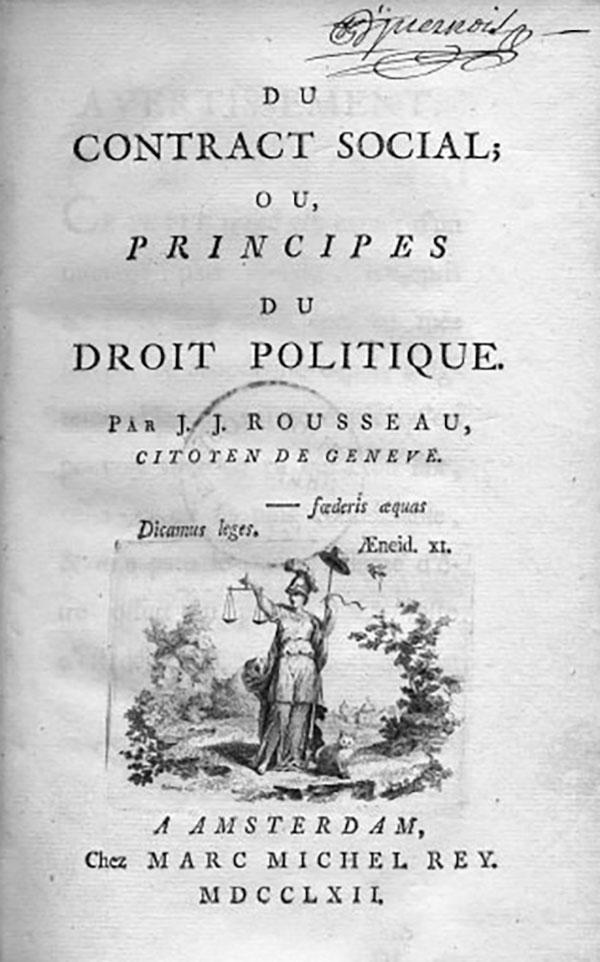
Above, the title page of an early edition of “On the Social Contract, or the Principles of Right” by Jean-Jacques Rousseau. The book was foundational to the idea of consent of the governed.
Rousseau meant the idea of “the general will” to reflect a clear, higher community interest (such as education), as opposed to an individual one. Another modern example would be the protection of an old-growth forest against clear-cutting by a landowner or, more broadly, the protection of the planet from climate change over corporate interests to exploit fossil fuels.
The concept, however, was misused. When the French Revolution descended into the Reign of Terror under a radical faction in 1793–94, its leader Maximilien Robespierre used the concept of “general will” to justify imposing a dictatorship. He aimed to create a “republic of virtue” and rid France of the corruption and moral decay of the ancien regime (the absolute monarchy). Robespierre was himself soon overthrown due to his violent extremism, which resulted in an estimated 17,000 executions and 10,000 additional deaths of those imprisoned. A period of political instability followed as Europe’s great powers continued to try to restore monarchy to France by military means.
The Revolution's original ideals — as expressed in the motto “liberté, égalité, fraternité” — inspired a tradition of republicanism in France, in Europe generally and elsewhere around the world.
Ultimately, republican rule gave way to Napoleon Bonaparte, an army officer whose military success allowed him to seize power as First Consul and later to anoint himself Emperor. In doing so, he created the world’s first modern military dictatorship — the first French Empire — and waged wars of conquest against Europe’s monarchies. Napoleon was ultimately defeated and the Bourbon dynasty restored but now with constitutional limits.
While the French Revolution failed in establishing a stable regime, its anti-monarchist principles were instilled within France and were spread across the continent. The Revolution's original ideals — as expressed in the motto “liberté, égalité, fraternité” — inspired a tradition of republicanism in France, in Europe generally and elsewhere around the world.
The 19th and 20th Centuries: An Overview
Consent of the governed and democratic governance advanced in fits and starts during the 19th and early 20th centuries, but saw steady progression in North America, Europe and South America (see Country Studies for more detailed accounts in many of the countries). Still, consent of the governed existed in only a minority of nation states at the beginning of the 20th century. Nor was universal suffrage the norm until after World War II (see also "Universal and Equal Suffrage" in History in Free, Fair and Regular Elections).
Fascist Italy, Nazi Germany, Imperial Japan and the Soviet Union then seized or established military dominance in country after country in Europe, Africa, the Middle East and Asia. The very survival of democracy was in question.
The end of World War I in 1918 brought the defeat of Imperial Germany and the fall of the Austro-Hungarian, Russian and Ottoman Empires. Out of this unprecedented re-ordering of nation states, there was a great expansion of democratic governance and popular suffrage, including for women, in a period Europeans called the “springtime of nations.”
In the 1920s and 1930s, however, two powerful anti-democratic ideologies, Fascism and Communism, took hold in much of Europe and spread to other continents. The trend was ominous. An Axis of Nazi Germany, fascist Italy and Imperial Japan set the stage for world conflict. A pact in August 1939 between Nazi Germany and the Soviet Union launched World War II. Fascist Italy, Nazi Germany, Imperial Japan and the Soviet Union then seized or established military dominance in country after country in Europe, Africa, the Middle East and Asia. The very survival of democracy was in question.
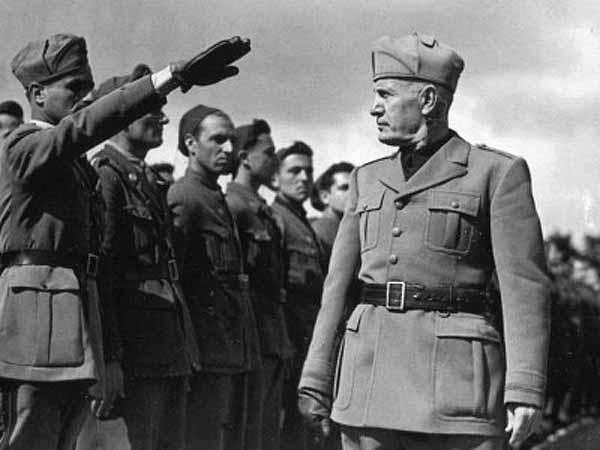
Benito Mussolini ushered in the age of fascism and the fascist salute with his coming to power in Italy in 1922. Shown here in Ethiopia after Italy’s invasion in 1935.
The tide turned due to Hitler’s invasion of the Soviet Union in June 1941 and then Japan’s attack on Pearl Harbor on December 7 the same year. These attacks brought the U.S. into the war and led to the forming of a military alliance of the United Kingdom, the Soviet Union and China, among many other nations, that ultimately triumphed over the Axis Powers.
With the end of World War II in 1945, democracy was restored or introduced in most of Western Europe and Japan. It also advanced in a number of Latin American and Asian countries. But fascist dictatorships still ruled in much of southern Europe. The Soviet Union broke its alliance with the U.S. and UK to impose a repressive communist system on countries it occupied in Eastern Europe. The USSR also aided successful communist guerilla armies to take power in Yugoslavia, China, North Korea and North Vietnam. Colonial rule and autocracy still remained the norm in much of the rest of the world.
During the 1950s and 1960s, the United States achieved significant legislative, judicial and constitutional change through a movement of non-violent civil disobedience to end legalized discrimination and the restriction of voting rights for Black Americans and other minorities. This made the United States a full democracy with universal suffrage for the first time in its history. The American Civil Rights Movement became a model internationally for achieving political change through non-violence and mass mobilization of civil society (see an account of that history in Majority Rule, Minority Rights).
Also in the 1950s and 1960s, many countries in Asia and Africa gained independence from the remaining European empires as a result of popular movements against colonial regimes. Colonial rule was replaced both by democracy, as in Kenya and Botswana, and by authoritarian and communist regimes, as in Sudan and Vietnam (see their accounts in Country Studies). Consent of the governed was still practiced in a minority of nation states.
Beginning in 1974, the world saw steady expansion of democracy and self-rule. . . . The number of electoral democracies counted by Freedom House’s survey, Freedom in the World, rose from 44 out of 135 countries and territories in 1973, when the annual review was launched, to 120 out of 192 countries and territories in 2000.
Beginning in 1974, the world saw steady expansion of democracy and citizen self-rule. Fascist and military regimes fell in Portugal, Spain and Greece in Europe in the mid-1970s. Military dictatorships also fell throughout Latin America and many parts of Africa and Asia in the 1980s and early 1990s. Multiracial democracy replaced apartheid in South Africa in 1994. In 1989-91, communist dictatorship collapsed in former Yugoslavia and the entire Soviet bloc. In most cases, the overturning of dictatorship was the result of mass citizen uprisings and popular movements for democracy and independence.
In a majority of cases, authoritarian systems gave way to democracy and constitutional government. The number of electoral democracies counted by Freedom House’s survey, Freedom in the World, rose from 44 out of 135 countries and territories in 1973, when the annual review was launched, to 120 out of 192 countries and territories in 2000. Many of these were still categorized by Freedom House as just “partly free,” but a large number were trending towards greater respect for political rights and civil liberties.
The Recent Trend
While the larger trend since World War II, and especially since 1974, was towards democracy and away from dictatorship, many exceptions remained. These included the communist dictatorships in China, Cuba, North Korea and Vietnam; the autocracies that took hold in the former Soviet Union such as Azerbaijan, Kazakhstan and Uzbekistan; the theocracy of the Islamic Republic of Iran; and monarchical rule and other forms of dictatorship in the Middle East, Africa and Asia, such as Saudi Arabia, Syria (until recently), and Sudan. (See the linked Country Studies of these “Not Free” countries.)
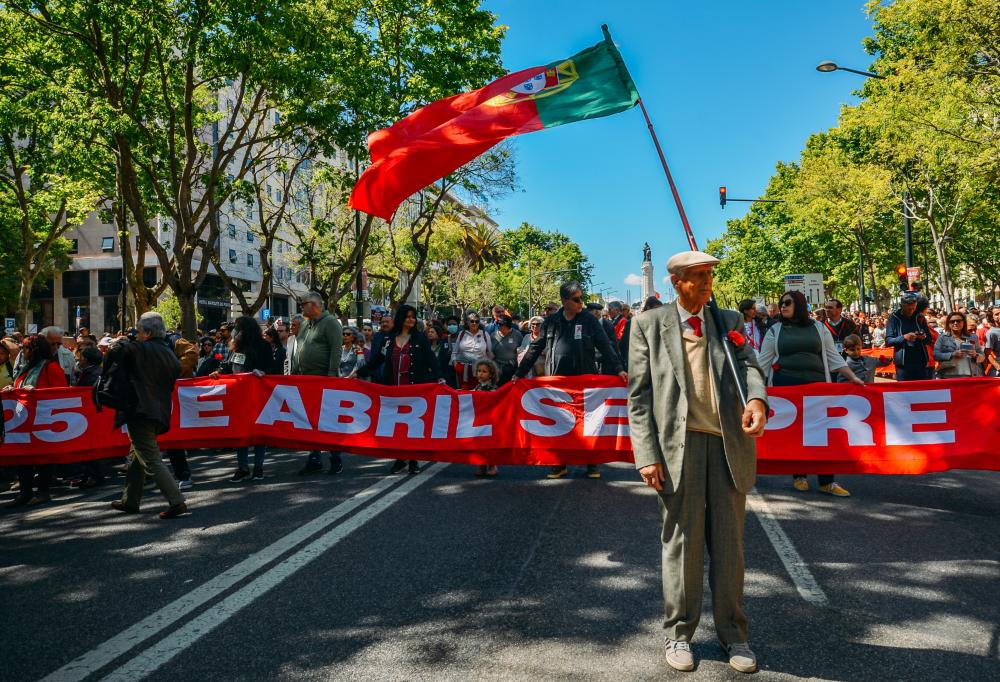
A commemoration in Lisbon, Portugal of the Carnation Revolution that overthrew the military dictatorship in 1974. The date marks the beginning of the “third wave” of democracy’s expansion. Shutterstock. Photo by: Alexandre Rottenberg.
Beginning in 2006, overall standards of political and civil freedom and democracy began to fall steadily throughout the world. . . . Still, democracies have shown some resilience, with parties and candidates that assert democracy’s basic principles winning majorities of the vote in most of Europe and the Western Hemisphere.
As well, beginning in 2006, overall standards of political and civil freedom and democracy began to fall steadily throughout the world. Most significantly, there was a rise in authoritarian-style rule in electoral democracies as diverse as Hungary, India, Russia, Turkey and Venezuela, among others. These are now often described as “electoral autocracies.”
In 2024, the Freedom in the World Survey reported the eighteenth straight year of overall declines in its global freedom rankings. A majority of countries and territories still have electoral democracies, with most categorized by Freedom House as “free.” But nearly 80 percent of the world’s total population of just over 8 billion people today live in “partly free” or “not free” categories.
The most significant change in this regard was India, with 1.4 billion people, which fell from “free” to “partly free” status. (India’s 2024 election, the largest ever held by population, denied a full majority to its ruling party, and thus potentially curbed the abuse of power by forcing it into a coalition government.)
[P]eople around the world continue to raise their voices in opposition to dictatorship and in support of democracy and freedom through mass protest and other forms of resistance.
Rankings for established democracies that remained in the “free” category also have fallen in the last decade. Poland and the United States fell the most significantly in the 100-point scale (by 12 and 9 points, respectively) and represent a trend in the rise of ruling political parties adopting anti-democratic governing practices. (See Current Issues sections in the linked Country Studies and also “The United States: A Significant Test Case" subsection in Essential Principles.)
Still, democracies have shown some resilience, with parties and candidates that assert democracy’s basic principles winning majorities of the vote in most of Europe and the Western Hemisphere. This is the case in a wide range of countries, from Chile to France. Also, people around the world continue to raise their voices in opposition to dictatorship and in support of democracy and freedom through mass protest and other forms of resistance. This is the case even in harshly repressive and violent circumstances, such as China and Sudan (see Country Studies).
The content on this page was last updated on .